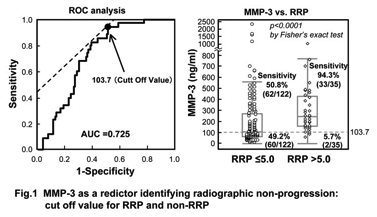Session Information
Session Type: Abstract Submissions (ACR)
Background/Purpose: Studies have shown that treating rheumatoid patients with methotrexate (MTX) monotherapy initially and later providing an option to step up to combination therapy produces outcomes similar to those seen with combination therapies of conventional drugs and/or biologics provided immediately (O’Dell JR et al. Arthritis Rheum 65:1985, 2013). In their study, approximately 30% of the patients treated with MTX monotherapy did not require subsequent combination therapy. However, this subgroup was clinically and radiographically indistinguishable from those who required it.
The purpose of the present study was to assess the efficacy of low-dose MTX monotherapy, a regimen which is commonly prescribed in Japan, and to identify a subgroup of patients whose radiographic progression is halted in response to MTX monotherapy. In the present study, 161 rheumatoid patients were treated continuously with low-dose MTX monotherapy continuously for 3 yrs until significant adverse events or radiographic progression were suspected.
Methods: Rheumatoid patients treated with low-dose MTX monotherapy (n=161) were followed prospectively for 3 yrs. Their disease activity and radiographic progression were evaluated with reference to disease activity score 28 (DAS28), modified health assessment of questionnaire (mHAQ) and others and by the change in van der Heijde-modified total Sharp score per year (ƒ¢TSS), by classifying patients into subgroups showing structural remission (REM; ƒ¢TSS≤0.5), radiographic progression (ƒ¢TSS>3) or rapid radiographic progression (RRP; ƒ¢TSS>5).
Results: Disease activity was improved yearly, from baseline to 3 yrs: DAS28-ESR (3) improved from 5.2±1.1 to 3.9±1.4 (p<0.0001), %DAS28 remission from 1% to 19%, mHAQ from 0.54±0.47 to 0.18±0.32 (p<0.0001), mHAQ remission rate (ƒ¢mHAQ<0.5) from 16% to 60%, and Boolean remission from 0.8% to 24.0%. During the 3-yrs of MTX monotherapy, the ratio of the patients classified into the REM group increased from 38.5% to 50.4% (p=0.0466), those in DTSS>3 decreased from 34.2% to 20.4% (p=0.0095), and those in RRP decreased from 21.7% to 10.9% (p=0.0190). In particular, the patients with active disease who required biologics arose mostly from the RRP group, followed by the CRRP group. This was, however, not the case when the patients were classified according to disease activity, i.e., DAS28. Receiver operating characteristic (ROC) curve analyses showed that serum matrix metalloproteinase-3 (MMP-3) levels of below 103.7 ng/ml at baseline predict a patient subgroup with no radiographic progression.
Conclusion: Approximately half of the patients given low-dose MTX monotherapy showed no radiographic progression over 3 yrs. A subgroup with no radiographic progression was predicted at outset by lower serum MMP-3.
Disclosure:
K. Shiozawa,
None;
T. Yamane,
None;
M. Murata,
None;
C. Tanaka,
None;
N. Yo,
None;
R. Yoshihara,
None;
Y. Tanaka,
None;
K. Tsumiyama,
None;
S. Shiozawa,
None.
« Back to 2014 ACR/ARHP Annual Meeting
ACR Meeting Abstracts - https://acrabstracts.org/abstract/serum-mmp-3-predicts-a-subgroup-with-no-radiographic-progression-in-rheumatoid-arthritis-patients-with-low-dose-methotrexate-mtx-monotherapy/

